- Home
- Laura Anne Gilman
Staying Dead Page 23
Staying Dead Read online
Page 23
This had been a refuge. Now everything had her touch on it.
Now his past had her touch on it as well.
Both things were going to take some getting used to, he suspected.
“More to the point,” he continued, “is why did you happen to stop by on this particular night?”
Wren fidgeted in her seat, clearly wanting to deflect that particular question. “Um…would you believe a premonition?”
“No.” Her foresight skills were, to put it bluntly, nonexistent. Purely in the here and now, was his Wren.
She shrugged as if to say it was worth a try. Pouring a glass of orange juice into the tumbler, she contemplated its sparkling clear sides. “Why can’t I ever get my glasses that clean? Mine are always cloudy.”
“Wren…” He shook his head, smiling a little. She was like a five-year-old sometimes, trying to avoid topics.
At the exasperated tone in his voice, Wren felt like giggling. Some things might change, but some things didn’t. Wouldn’t. It was still fun to tweak Sergei’s chain.
“P.B. stopped by yesterday…Christ, yesterday afternoon. Only then? Anyway. Long talk. Cosa stuff.” She wondered briefly if she should tell him, then decided against it. Yeah, okay, she was invoking a double standard, since she’d spent the last six hours digging his past out of him, but…Cosa stuff. He wasn’t involved in that, even by virtue of being her partner. Not really. She ignored the little voice that reminded her that Sergei—her partner—had been her surrogate to the Council, and she’d been more than happy to let him do that. It always made him uneasy, anyway.
And the other stuff, the lonejack stuff…it could wait. God, bad enough when she had two reasonably simple jobs, not—she tried to gather all the strands around her now—job, Council, fatae, and now this with the Silence, and felt her brain whimper in protest.
No, put that aside for now. She was distracted enough; they both had way too much on their plate right now. No need to add something more in when it might not even be anything at all.
Wren had a sneaking suspicion she wasn’t making the brightest of decisions, but…it wouldn’t be the first or last time she’d done that. And…there was just the tiniest, sneakingest uncertainty in her brain. How much of what he had learned had he told this Silence? How much of what she had told him had he passed along? There were loyalties here, and they were all tangled up, and she needed time to sort them out.
“Anyway.” What had they been talking about? Oh, right, P.B. “Made me need to take a long walk afterward.”
“Across town? Must have been quite some talk.” But he didn’t push the question further, as she’d known he wouldn’t. Especially not tonight. This morning. Whatever.
“Yeah. But I got tired and realized I’d gone out without my wallet, and…”
“And then you realized that you could just drop in and borrow subway fare?”
“Well…I was sort of hoping for cab fare, actually…” She tried for kittenish; yawned instead and felt the exhaustion drag at her. Internal and external. She checked, an automatic reflex, and the pool of current barely stirred inside. Bad. Very bad. She could call on external sources if she needed to do anything flashy, of course, but it was like…it was like trying to go on no sleep for a week, was the closest she could have described it. Being able to do something didn’t mean it was a good idea. She was going to need to recharge, and soon. Being caught in an emergency and draining someone’s building was really bad manners.
He slid the omelette out of the pan and onto a plate, then sliced it neatly in half and transferred one section to another plate. On cue, the toaster popped, and the scent of warm bread almost overwhelmed the eggs. Her stomach rumbled, and he laughed at her.
“Eat first. Cab later.”
He sat down next to her, their legs bumping under the counter, and picked up his own fork. Wren followed suit. Neither of them were anything more than okay cooks, but she was starving.
By the time they had cleared the dishes and put everything away, it was almost eight. Sergei went to take a shower, muttering something about an appointment later that afternoon.
Wren could have used one herself, but she had no spare clothes stashed here and the thought of getting clean and then climbing back into her dirty clothing was, well, disgusting. She could live in the same pair of jeans for a week, if need be, but once she was clean she wanted to be clean all over.
She was, however, willing to steal a fresh pair of socks. And it had nothing…well, maybe a little to do with checking out Sergei’s bedroom.
After putting on another pot of coffee, she climbed the wooden steps up to the loft, and looked around. It was interesting, in a sparse, sort of Japanese way. A low bed covered by a dark red comforter and two feather pillows. The bed was weirdly squared off; full, not king-sized like she’d expected. Then again, it wasn’t like there was a huge amount of room in the loft to fit a larger bed in. An armoire and a low dresser, both of the same honey-blond finish as the bed frame, were up against the wall, and a laptop desk on rollers stood by the bed, lacking a laptop but piled with papers and a blue and white cup and saucer that looked too expensive to be left there. And that was it.
Wren would have investigated—all right, she admitted, call it was it was, snooping—further, but just then she heard the water from the shower shut off. She took a guess at which drawer her partner kept his socks in, grabbed the first black pair that came to hand, and skedaddled down the steps. She grabbed her boots from where she’d left them by the sofa, and grabbed her jacket off the banister she’d used as a coat rack, and then went back into the kitchen. Sergei was already there, pouring himself a mug of the freshly-brewed coffee. He was wearing dress slacks and a crisp white button-down shirt, his hair still wet and slicked back, and she suddenly felt grungy and disgusting in a way that had everything to do with needing a toothbrush and about ten hours of sleep. She took a quick look out the one narrow kitchen window and saw that the predawn clouds had thickened. Wren’s eyes widened, and she could practically feel her nerve endings coming to attention. “Damn. How did I miss this one coming in?”
“You were a little preoccupied last night?” her partner suggested mildly, getting up to rinse his mug and put it in the dishwasher. She accepted the truth of that. His building was modern and heavy and really well insulated; add in her own emotional distress, and it wasn’t all that surprising she hadn’t picked up on the storm tendrils reaching into the city. “A front moved by just to the south of us last night, according to the news, but it probably wasn’t close enough to get you hungry.”
Which she was, now. Starving, in fact, for something no amount of food could ever satisfy. Sergei took one look at her face and hustled her downstairs. The doorman whistled them up a cab and packed them into it, Sergei coming along with her. She didn’t even bother to argue. There had been an incident almost five years ago, involving a storm and a narrow balcony, that she was never, but ever going to live down.
By the time they got downtown to her building it was midmorning, and the air was heavy, thick, as though trying to recalculate itself into a solid. Wren dropped her bag off in the apartment and then climbed the fire escape up to the roof. She stood a safe distance away from the railing, surrounded by other brownstones and storefronts, the landscape of her neighborhood. She was hyper-aware of the rising noises of traffic from the streets below. The smell of the city in springtime, the sharp tang of ozone coming down from the sky competing with the harsher exhaust rising from the street. But in her mind she was standing on a hill, with grass underfoot, and the fresh, clean breeze of an oncoming storm tickling her skin, watching a front move closer to where she waited.
It was more difficult in the city. But difficult wasn’t always a bad thing. Having to work for something meant you were more willing to follow protocols. Protocols—the structure for drawing down power—eased the difficulty. They also meant that you were less likely to get caught up in the current surrounding you.
Less like
ly to wizz.
A low rumble of thunder sounded again, the growing darkness overhead promising a spring thunderstorm. The wind had picked up in the past few moments, and Wren’s T-shirt billowed where the wind caught at it, making her thankful for her leather jacket. But even without the signs, the accumulation of cumulonimbus clouds earlier during the day, or the thunder just now, or the warnings on the news, Wren would have known a storm was coming. Known it in the way the hairs on her arms and neck tingled. Known it in the edginess which invaded her system, and the way her breathing kept wanting to speed up without having exerted herself.
Like calls to like. An electrical storm carried with it power in a multitude of forms. Benjamin Franklin hadn’t been looking for a new way to light up houses when he went out with his kite and his metal key. For most Talents, man-made electricity was the only way to go. Pick your source according to your ability, your need, and siphon off what you want. It was already tamed, controlled. There was no risk it would sweep you over, snap the bindings that kept you inside your own head and send you flailing into an uncontrollable wild current.
Less risk. Less satisfaction. Less chance of addiction. Wren could tell herself that she was merely on the roof in order to get some fresh air. That she only wanted to feel the pressures shifting as the storm front rolled in. But if she didn’t lie to Sergei often, she almost never lied to herself. Her eyes closed, face lifted to the east where she could feel the front coming in from New Jersey.
Long ago, they used to blame changes of weather for people’s moods, a pseudoscientific theory popular enough to affect the outcome of criminal trials. With any luck, a nice small thunderstorm would be enough to recharge her both magically—depleted after the house job—and emotionally. Then she could go back downstairs and deal with the ongoing assorted disasters without snapping at Sergei again.
What remained of the morning light faded into gloom as the clouds arrived overhead. Lights snapped on down below on the streets, and windows began to glow with lamps and overhead lights. A slow roll of thunder, much closer, and a light rain began to fall in the city. She took off her boots and socks, and tossed them back to the small shed that housed the emergency stairs, trusting that they would fall under the overhang and not be ruined by dampness. She thought about putting the jacket there too, but kept it on despite the sweat prickling under her arms and down the line of her spine. It was comfortable. Comfort was important, too.
Now. Center yourself. Feel the ground under your feet. She could hear her mentor’s voice in her ear, although the memory was over a decade old. And although there was tar and concrete underfoot, and more concrete beneath that, she could feel her connection to the earth intact, taking her down past the bedrock which made up the island of Manhattan, spreading runners and setting roots in the solid strength of the living dirt, anchoring herself in the memory of atom to atom, mud to mud. Center. Ground. Anchor. All words meaning the same thing: remember yourself.
When the first flash of lightning cut through the sky, Wren was ready for it. Deep in a receptive state, she reached up to touch it. But it was too faint, too quickly faded for anything other than a pleasurable sizzle. The rain increased, quickly soaking Wren through to the bone. Her jeans and jacket were a sodden weight, but she didn’t feel it. Her toes curled, as though digging themselves into rich, muddy loam. Her head tilted back, her hair slicked to her skull, rain washing her face as she laughed up into the storm. Another roll of thunder, then a crack of lightning. The storm was closer, sailing into Manhattan like a queen ascending her throne. Elementals buzzed in the wires, singing their happiness as static. Wren could feel it building inside her, a tension from stretching too far, anticipating too much. Back off a little. Wait.
Center. Pause. Check grounding. Wait for the thunder. Focus. Reach.
It was like sticking your tongue into an electrical socket, the adrenaline of a roller coaster’s free fall, the instant of solitary orgasm. The reason wizzarts chased the essential moment, the philosopher’s stone of transmutation, crude flesh into something transcendendant. Raw power filled her, surged through her body. The temptation was there to ride it, just let it take her where it would.
No. Control. Focus. Bring it in. And slowly, slowly, painfully-pleasant, Wren forced the current to go where she directed it. They quarreled, and she held firm. It resisted, a tangible, almost-alive force, then submitted to the power of her will, and the protocol-raised walls.
The rain slowed to a faint pattering. The clouds still hung directly overhead, but the sun was beginning to glint again across the Hudson River, and the darkness was cut through by slightly less threatening-looking clouds moving in. Wren drew in a deep breath, feeling the answering surge of magic settling into her body and pooling into the reservoir she had made for it. Satisfied and satiated, she raised her arms high overhead in a full body stretch. And, as though in sympathy, a narrow rainbow appeared, arching from dark cloud to lighter one, almost directly overhead.
“How do you do that?” Sergei asked, part in awe, part in irritation.
Wren shrugged, not surprised, having sensed him somewhere in the back of her brain, when he came out to join her. “Magic.”
She wasn’t kidding. Mostly.
He made a sound that might have been a snort, and she felt him coax the wet jacket off her shoulders, tossing it aside with a sodden thunk. Then his arms wrapped around her, fitting his dry suit jacket over her wet skin. For a moment, she let herself relax into it, the warmth and the security it promised. His jacket was cat-soft, the way expensive wool could be, and smelled like Sergei, a mix of salt and mint-spiced cologne that she could pick out in a crowd, if need be.
It didn’t matter what he didn’t tell her, she realized almost lazily. They’d hurt each other before. They were going to do it again in the future, no matter how much they didn’t want to. You couldn’t get that much under someone’s skin, that much in their blood, and not know exactly how to hurt them, even without trying. But the bliss…the bliss that you could create, in that closeness…She giggled with the thought of it. Maybe not now. Maybe not even soon. But it was there. Waiting. Like current, coiled inside them.
“Feel better?” he asked.
“Oh, yeah. Come on, let’s get back to work.”
The second front arrived about an hour later. All around the city people cursed, struggled with umbrellas, dashed into the nearest overhangs or ran, newspapers over their heads, for subway stops and building lobbies. Sergei, at Wren’s request, opened all the windows in the apartment to let in the cool, wet air. She was still riding a high from the power feed, pacing the apartment like a caged tiger, occasionally stopping by a window to sniff the rain-laden air.
“Something’s going on,” she said suddenly, stopping by the kitchen doorway.
Sergei, printouts and notes spread out over the kitchen table, looked up at her over the rims of his reading glasses. “How so?”
“I don’t know.” She continued pacing down the hall. “But I know.”
“Well, let me know when you know what you don’t know how you know,” he said, not expecting an answer. She had sucked in so much power, her blood was probably vibrating. He wouldn’t get anything useful out of her until it had all settled in and been absorbed. And the storm being overhead would make it worse, not better. Anything could be going on in the city right now. And, knowing the city, and the players in it, anything probably was.
But none of it was likely to concern them.
The Frants lobby was still as pristine in its marble and chrome as it had been almost a week before, when Wren had been brought in to investigate. The storm—now directly overhead—muted the light coming in through the high windows, casting a subdued hush that seemed to mute the security guards sitting behind the desk, talking over the previous day’s baseball scores.
“Please. A lucky play. If he’d fooled the runner into thinking he’d caught it—”
“In your dreams. Face it, there ain’t gonna be a post season for thos
e jokers this year.”
“Least we’re still in the running. The Mets couldn’t get a wild-card slot if you gave ’em Willie Mays in his prime back.”
They continued wrangling quietly, eyes trained on the monitors with the casual ease of professionals. One even still sat like a cop, left hand dropping to easy reach of a nonexistent gun in a nonexistent holster. The only other motion was the occasional employee coming back very late from lunch, or leaving early, heels clicking on the marble, or thudding soundlessly on the all-weather runners put down to protect people from slipping on wet marble. A siren wailed, a few streets over, and the voice of the ambulance driver hailed cars in front of him. “It would be nice if you got out of the way.” New York courtesy—the “asshole” unspoken but heard anyway. The quality of light shifted, as though a cloud had passed, allowing a flash of sunlight to escape, then the foyer was shadowed again. The former cop stopped, rubbing his right hand across the back of his neck, as though something had prickled the hairs there.
“Did you…” he started.
“What?” His partner looked at him curiously.
“Never mind. Must have been a draft or something.”
The ghost moved past the humans, dismissing them from its narrow focus of concentration. They were workmen, hirelings. Not the one he was looking for. The surroundings were wrong, different, but he knew the lines of the building, the feel of its structure, the soul within its walls—literally. This was his building. It had called him from where he had been, drawn him to the place where it began.
The place where it would end.
He simply had to find the one who had caused all this. Find him. Punish him.

 West Winds' Fool and Other Stories of the Devil's West
West Winds' Fool and Other Stories of the Devil's West Gabriel's Road
Gabriel's Road Morgain's Revenge
Morgain's Revenge The Shattered Vine
The Shattered Vine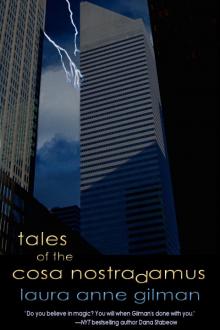 Laura Anne Gilman - Tales of the Cosa Nostradamus
Laura Anne Gilman - Tales of the Cosa Nostradamus The Camelot Spell
The Camelot Spell VISITORS
VISITORS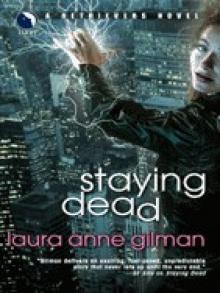 Staying Dead
Staying Dead Silver on the Road
Silver on the Road Weight of Stone
Weight of Stone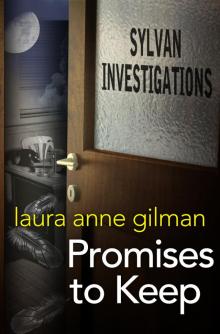 Promises to Keep
Promises to Keep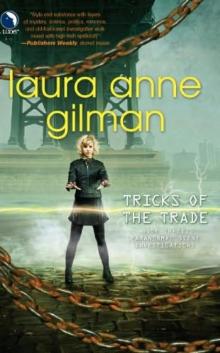 Tricks of the Trade psi-3
Tricks of the Trade psi-3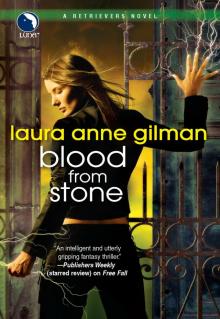 Blood from Stone
Blood from Stone Soul of Fire tp-2
Soul of Fire tp-2![Pack of Lies [2] Read online](http://i1.bookreadfree.com/i1/04/01/pack_of_lies_2_preview.jpg) Pack of Lies [2]
Pack of Lies [2] Burning Bridges
Burning Bridges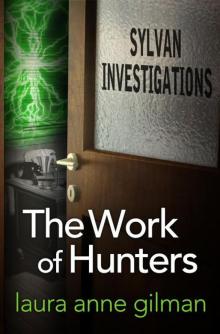 The Work of Hunters
The Work of Hunters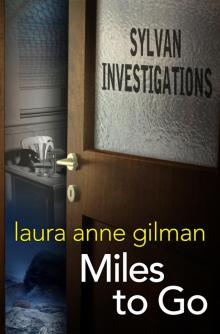 Miles to Go
Miles to Go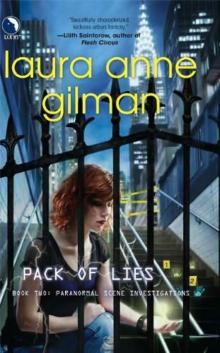 Pack of Lies psi-2
Pack of Lies psi-2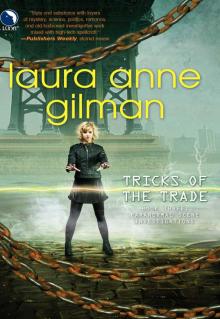 Tricks of the Trade
Tricks of the Trade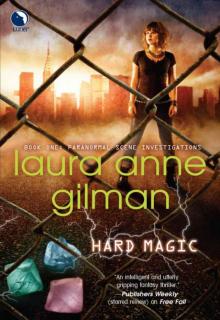 Hard Magic
Hard Magic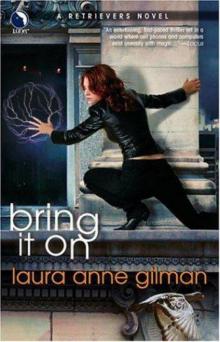 Bring It On
Bring It On Darkly Human
Darkly Human The Cold Eye
The Cold Eye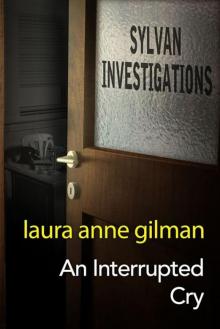 An Interrupted Cry
An Interrupted Cry Soul of Fire
Soul of Fire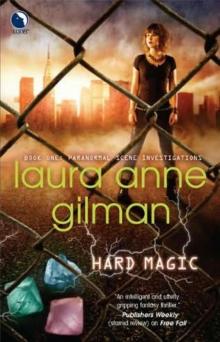 Hard Magic psi-1
Hard Magic psi-1 The Shadow Companion
The Shadow Companion Flesh and Fire
Flesh and Fire